Despite all the general election excitement, departments still need to get on with business as usual – which includes responding to requests for information. Aron Cheung says the latest FoI data shows signs of improvement in departments' response times, but a worrying trend in the percentage of requests that are being withheld.
Departments are withholding more information...
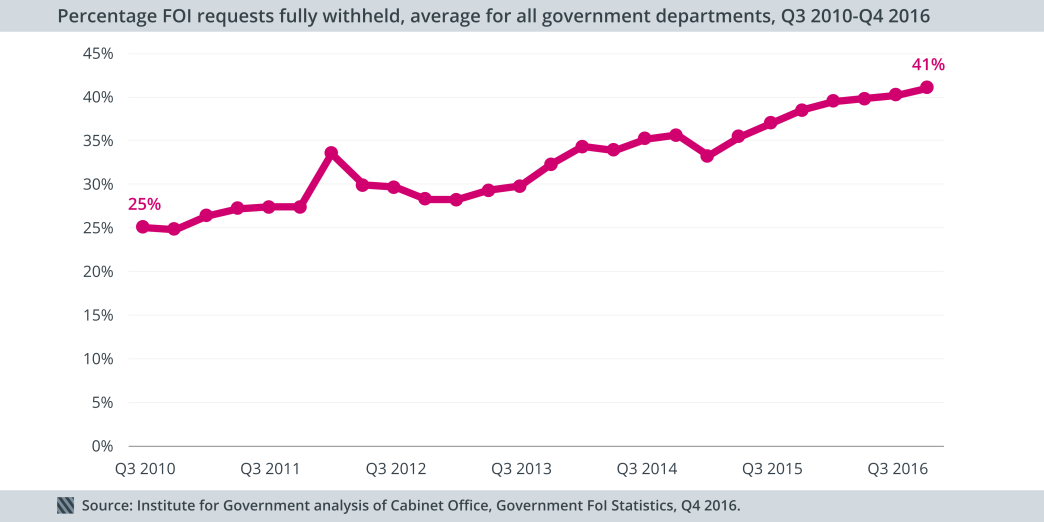
In total, the number of responses to Freedom of Information (FoI) requests that are fully withheld by government departments has steadily grown, from 25% in 2010 to 41% at the end of 2016. Government is continuing to become more secretive under Prime Minister Theresa May, which is perhaps not surprising: while Theresa May was Home Secretary, the Home Office was one of the worst performers on FoI.
… and DExEU is among the least transparent departments.
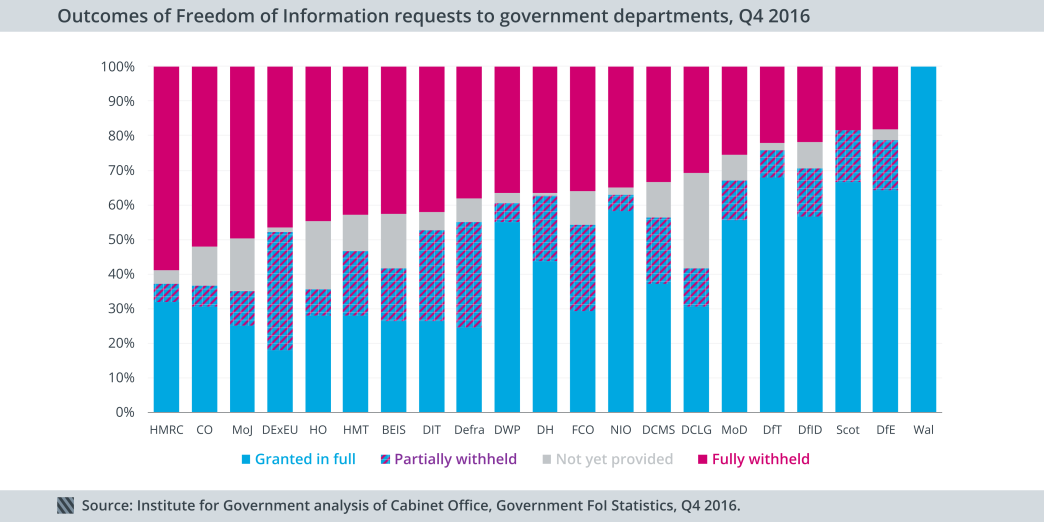
DExEU is among the worst offenders for withholding information. In the final three months of 2016, only 18% of FoI requests to the department were granted in full (that is, giving all the information asked for), the lowest of any department. Given it only received 73 ‘resolvable’ requests in total, this works out as only 13 requests. HMRC and the Cabinet Office fully withheld information over 50% of the time, while the Wales Office granted all 27 resolvable FoI requests it received in full.
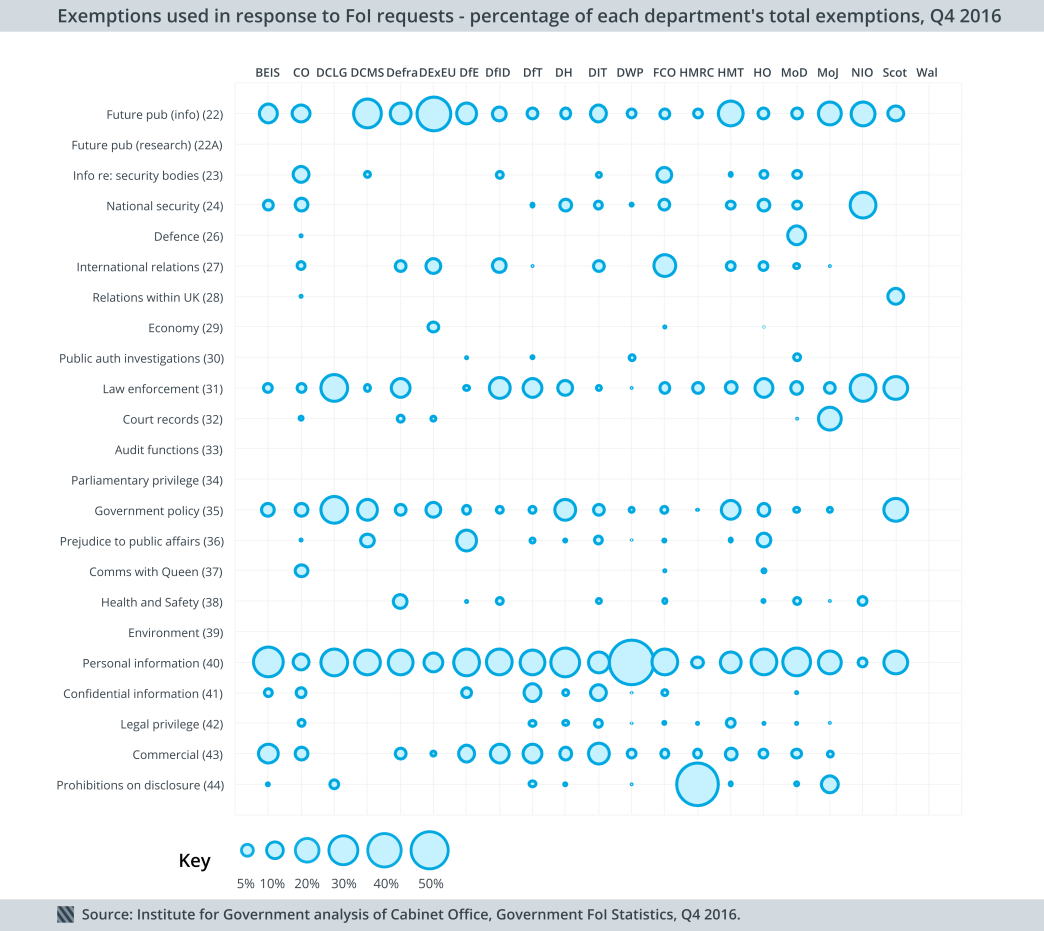
To withhold information, departments must apply one of the various exemptions under the FoI Act. The most frequently used exemption by departments is ‘Personal information’ – used especially often by DWP. DExEU, meanwhile, has used the ‘Future publication’ exemption (for information which is expected to be published in the future) most often.
Fewer departments are missing the deadline for responding.
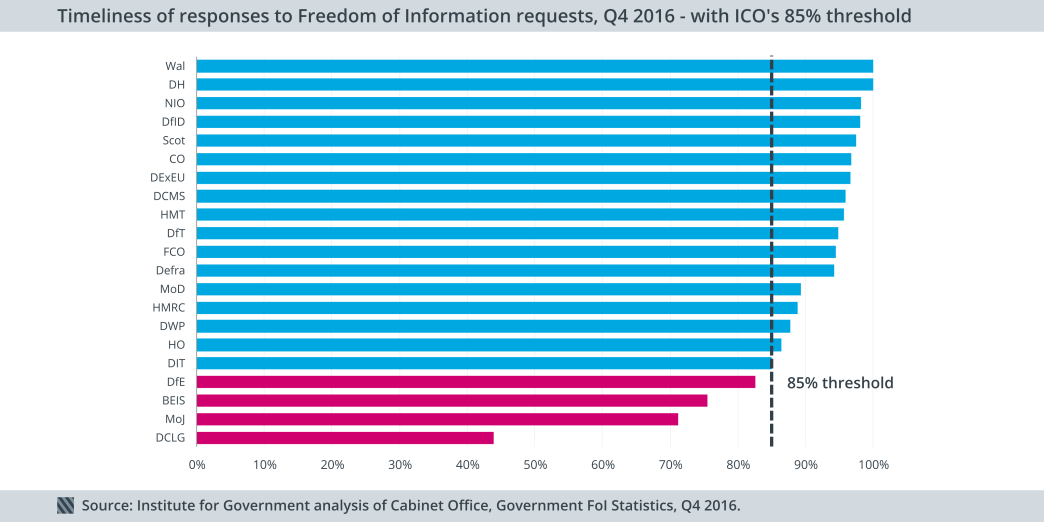
In the last quarter of 2016, four departments – DfE, BEIS, MoJ, and DCLG – failed to reach the Information Commissioner’s (ICO) 85% target for responding to FoI requests on time, down from seven departments in the previous quarter.
In its first full quarter with a new Secretary of State, the Home Office has moved above the threshold to 86%, although the ICO has recently ruled against the department for failing to respond in several cases.
As in the last quarter, DCLG is by far the worst performer in terms of timeliness, answering more than half (56%) of its FoI requests late. The delays in responding to requests may be an indication of administrative health in the department, which has seen its day-to-day spending budget more than halved since 2011/12 and deep staff reductions.
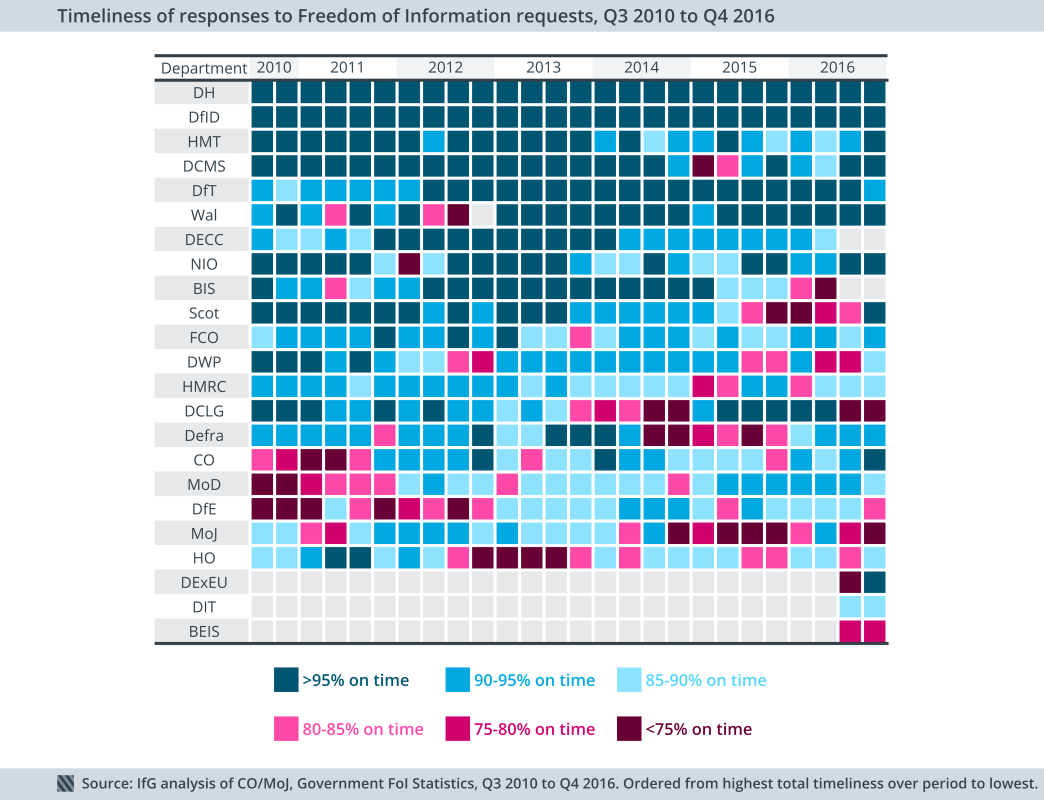
The timeliness of DExEU’s FoI responses has improved drastically – from 72% in Q3 2016 to 97% in Q4 2016. This may reflect the department reaching a level of administrative maturity, with the disruption caused by machinery of government changes beginning to subside. Alternatively, this may reflect the fact that a high percentage of requests to the department result in information being withheld.
Improvements has also been seen at HMT, FCO, CO, HO, DWP, and the Scotland Office. Other departments – DfT, MoD, and DfE – saw their performance fall, and three departments – DCLG, MoJ, and BEIS – failed to hit the 85% threshold for two quarters running.
Overall, volumes of FoI requests are fairly consistent for each department.
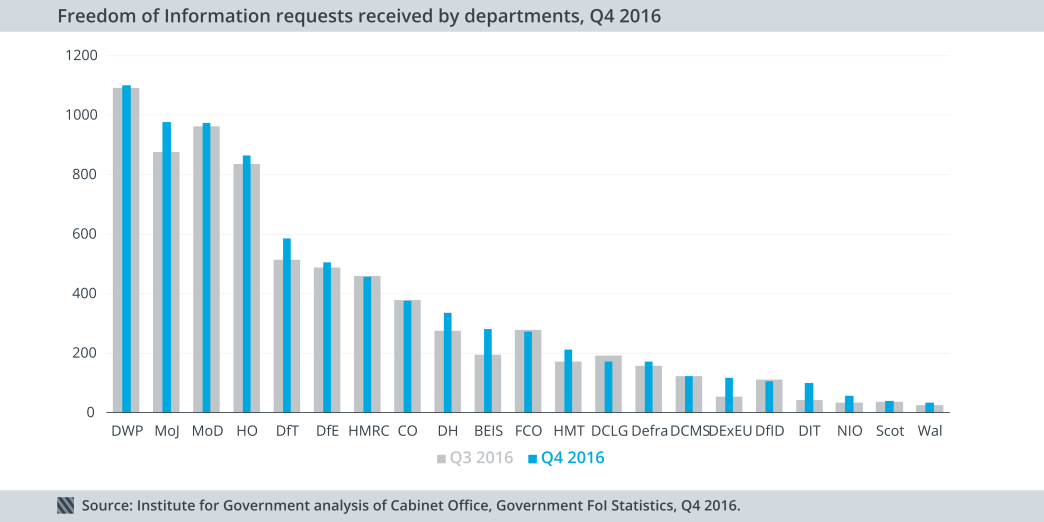
In the final quarter of 2016, DWP, MoJ, MoD, and HO together received almost 50% of all FoI requests. These departments also received the bulk of requests in the previous quarter.
In their first full quarter of existence, the three new departments – BEIS, DExEU, DIT – received relatively few FoI requests. DExEU received only 118 requests and DIT received only 100 requests.
The Cabinet Office has the highest percentage of requests being taken to internal review.
People submitting FoI requests can appeal the outcome if they are unsatisfied with the response. These appeals are first reviewed within the departments, and if that fails to resolve the issue, a further appeal with the ICO is possible.
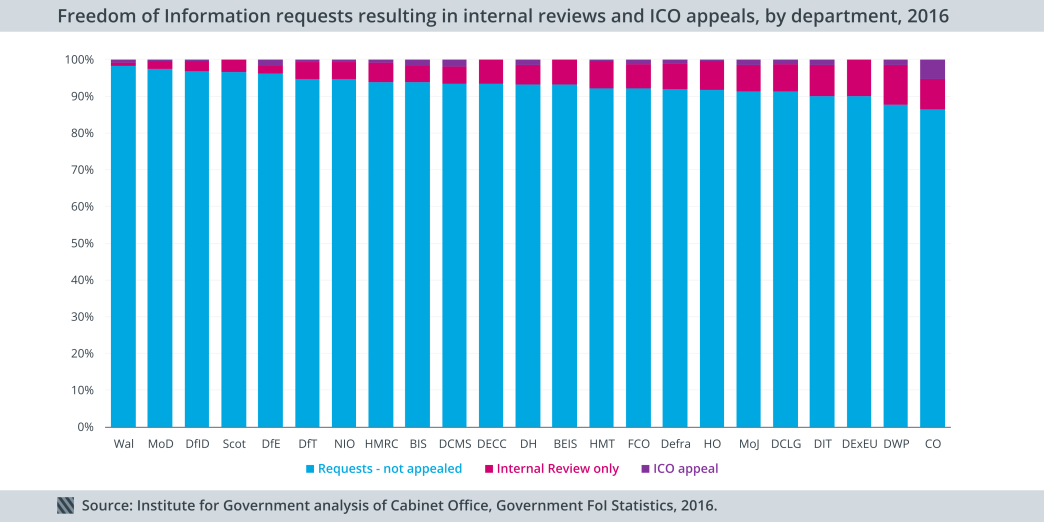
In 2016, the Cabinet Office – the department responsible for FoI policy – had 13% of requests go to internal review, with 12% of requests at DWP and 10% at both DExEU and DIT also being reviewed.
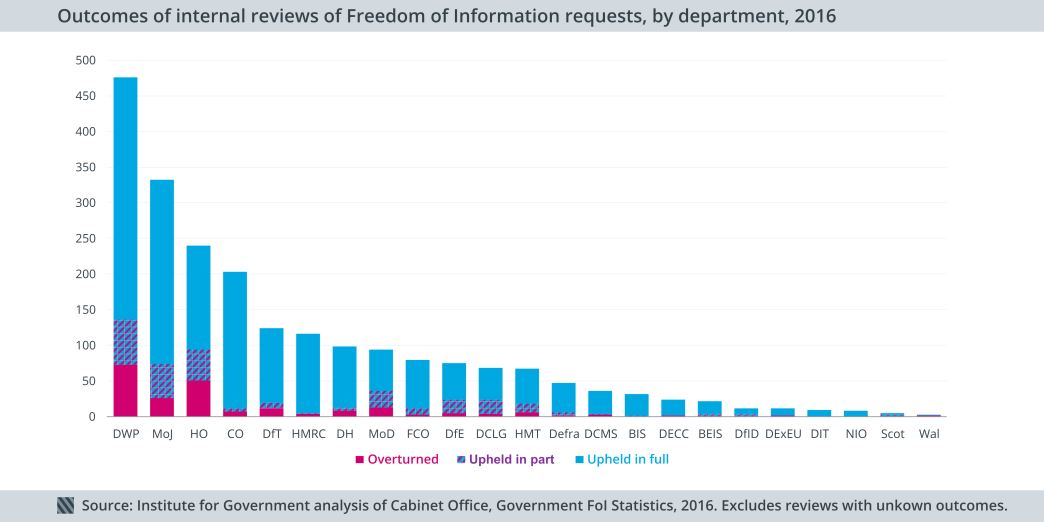
Departments upheld the original decision in full for 77% of the internal reviews they conducted in the last year. DWP had the highest volume of internal reviews (476), as well as the highest number of cases where the decision was overturned (73). The Cabinet Office, by contrast, had 203 internal review cases but only overturned its original decision seven times.
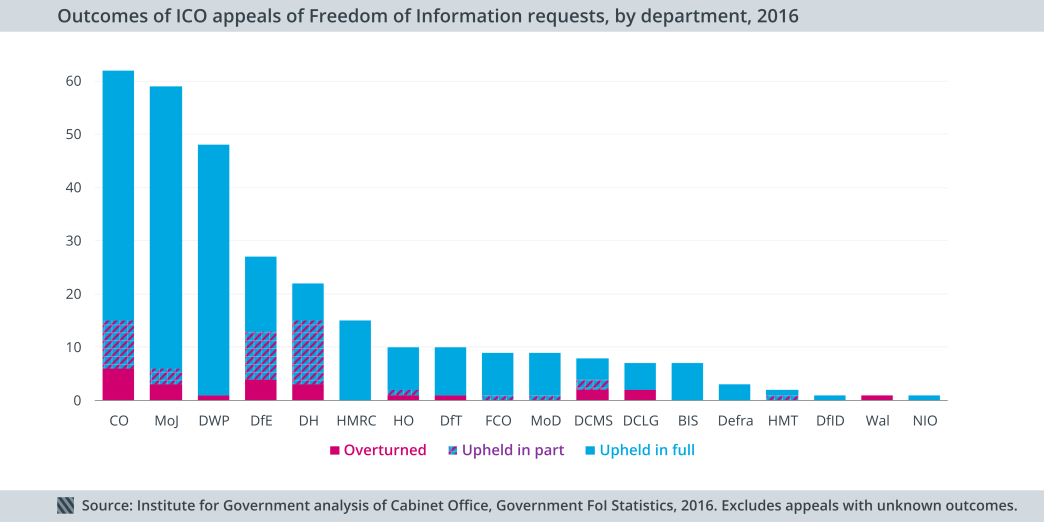
It is therefore unsurprising that the Cabinet Office is the department that has the highest volume of FoI requests that reach the ICO appeal stage, with 62 cases in 2016: 15 resulted in the original decision being overturned or partially overturned. In contrast, DWP (which overturned a greater number of decisions at the internal review stage) saw only one of its FoI decisions overturned at the ICO appeal stage, out of a total of 48 cases.
- Supporting document
- Whitehall monitor 17.pdf (PDF, 2.17 MB)